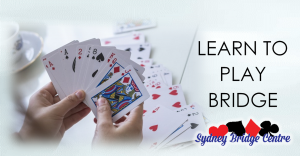City and Canada Bay – Monday Morning 26th August 2024.

Board 7 last week was an example of a complete misfit for North South. Each have a grand total of 2 cards in suits their partner has!
The great art to misfits (much easier said than done!) is identifying them as early as possible and stopping bidding. Time after time you see each partner bidding and rebidding their own suits and ending up far too high – sometimes doubled.
South is dealer and should normally start with a pass unless the pair is playing an opening bid showing a weak hand with both majors. West also passes and North will probably open 1♣ (originally with the intention of rebidding diamonds to show a strong hand). After all his hand could be immensely powerful if partner has a fit for one of his minors.
East will overcall 1NT (15-18 or thereabouts). Once again if South has a bid to show both majors (see advanced section for more discussion on bids here) that is the obvious thing to do. Otherwise he should probably just bid 2♥, his longest suit. Note that this shows a weak hand and is not forcing. This is often something that players find counter-intuitive. Why is that the case? Because if South had a good hand he could double 1NT for penalties. So any action that is not a double shows a weaker hand than that. It can often be very lucrative to double 1NT in these positions because if the 15-18 hand is opposite a very weak dummy it will play extremely badly as declarer will constantly have to lead away from his honours. Conversely the defenders’ hands are spread more evenly so they will have better communication with each other.
If South does bid 2♥ North should spot the warning signs. Partner has at least 6 hearts, a weak hand, and there is a strong hand sitting over his own hand. There is definitely a case for him to pass and get out now. He should certainly not now go through with his original plan to rebid diamonds – to do that at the 3 level would force partner to bid 4♣ to give preference and that could be far too high. He might choose to rebid 3♣ and this should send the same alarm bells to South who should get out as soon as he can!
If South has been able to make a bid showing both majors, then North can be even more sure there is a huge misfit. He can bid 2♠ but won’t like it!
What about the play? Against a club contract by North, East is likely to lead ♥A. This allows North to ruff, cash ♦AK and attempt to ruff a diamond loser in the South hand. This will allow the ♣J to score one way or another (either East discards or ruffs with ♣Q). The contract is still likely to end up going off (losing 2 spades, 2 diamonds and 2 clubs). But on this hand going -200 in 3♣ may not actually be that bad as other pairs will invariably be getting into more trouble!
A spade contract on the same lead could also fare well. North can ruff, play ♦A, ♦ ruff, 2nd ♥ ruff, ♣AK and then try to ruff another diamond. East can ruff in with ♠Q but declarer is getting close to making with 2 heart ruffs, 3 top minor suit tricks and then as many ruffs in the South hand that he can. Of course a trump lead will cause a lot more trouble and there’s a good case to do that – see advanced section for more on trump leads.
Another common problem you see with misfits is pairs ending in no-trumps. This can often be even worse than playing in a suit! You will usually have very little communication between the two hands which makes it almost impossible to set your suits up for tricks. It’s often better (or at least less bad!) to play in one of the hands’ long suits as trumps. That way you will at least score some tricks there and have some entries to that hand.
Key points to note
- When you suspect a misfit, get out of the auction! Even if you are in a poor spot you will often just make things worse by bidding further.
- The warning signs about misfits are when either partner or the opponents are bidding your short suits, especially if they show a 2 suited hand when you have neither of those suits.
- It is usually better (or at least less bad!) to play misfits in a trump suit. That way you at least have some communication. No-trumps can play really horribly with no way to set up tricks in any of your suits.
- Auctions where one player has shown two suits and the other has given preference often suggest a trump lead (especially if you have length in the 2nd suit) – the idea being to cut down declarer’s chance of ruffing his losers in the 2nd suit in dummy.
More advanced
After a 1 minor opening and a 1NT overcall, I mentioned above that it’s usual to play a 2 level bid as weak (on the grounds that any hand of about 10+ points will double 1NT). It is, however, also quite possible to play a bid of 2 of the other minor to show both majors. It’s the same sort of logic as when competing over 1NT – that it’s quite useful to have a bid to show both majors. On this hand it would work quite well. South could bid 2♦ after 1♣ 1NT and this definitely warns North of the misfit. He will probably bid 2♠ and hope for the best although there’s a risk that could be a 4-2 fit. But he could even take a view and pass 2♦! After all he knows from East’s 1NT bid that there is a club stopper sitting over his club suit (which is presumably at least ♣Qxx) so that means partner is very likely to be short in clubs. Even though partner has both majors he definitely doesn’t have to be 6-5 in them! If he is a more common 5-4 shape then he must have some diamonds. He is also known to have a weak hand. Passing 2♦ would surprise partner but it could be a winning action.
Whenever the opponents have an auction where one shows two suits and the other gives a clear preference to one suit, then a good holding in the 2nd suit points to a trump lead to try and prevent declarer being able to ruff your tricks in that suit in dummy. When the auction strongly calls for a trump lead it’s usually right to do so whatever your holding – so that would be the case for East here against 2♠ even though he holds ♠AQx. If the defence cash 2 rounds of spades, South can’t score any heart ruffs. Nor does he have the entries to set either minor up so he will end up losing at least 3 trumps and 3 hearts.
Even if the trump lead appears to give a trick away immediately it will often come back later because of the reduction in declarer’s ruffing ability. I remember a hand where we were defending after an auction that screamed for a trump lead. My trump holding was Qx, normally the last sort of holding you’d lead from. But when I did lead a small one, partner turned out to have singleton King, and the fact that I could draw a 2nd round of trumps when I next got in was critical because it took two ruffs away from declarer.
Julian Foster (many times NSW representative)



